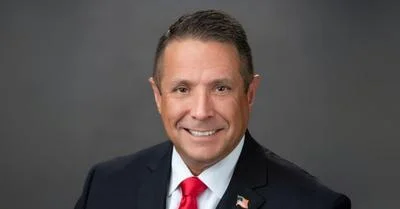Former president and current president-elect Donald Trump and Kerri Smith, the South Carolina President of Self-Help Credit Union. | Official portrait; Facebook
Former president and current president-elect Donald Trump and Kerri Smith, the South Carolina President of Self-Help Credit Union. | Official portrait; Facebook
An expected effort from former president and current president-elect Donald Trump to disallow mortgage loans to illegal aliens is anticipated to have an effect on the Self-Help Credit Union, which operates five credit unions in South Carolina.
During a Sept. 5 speech to the Economic Club of New York, Trump said that we would put an end to the practice of lenders offering mortgages to illegal aliens.
“We cannot ignore the impact that the flood of 21 million illegal aliens has had on driving up housing costs,” Trump said in the speech.
A recent Winthrop Poll shows that South Carolinians view illegal immigration as a serious issue, with an average rating of 7.7 out of 10, reflecting significant concern across political lines.
Trump argued such programs prioritize illegal aliens over American veterans and legal residents.
Self-Help Credit Union, which has received over $502 million in federal grants for its operations, has marketed federally-backed mortgage loans to illegal aliens.
Self-Help Credit Union was very active in South Carolina’s 2024 legislative session which spanned from January to May.
During the 2024 legislative session, Self-Help Credit Union and its advocacy arm, the Center for Responsible Lending (CRL), sought to restrict how installment lenders market their services with Senate Bill 910. The bill did not pass in the 2024 legislative session.
S-910 would have regulated and potentially restricted small dollar loans in South Carolina by imposing restrictions on how lenders market services to households and which households can be targeted.
Industry representatives have raised concerns about how the bill depicts their practices and emphasized its unintended effects, including the risk of potential redlining, due to its stringent restrictions on the neighborhoods where lenders can advertise.
Opponents to that legislative effort argued it could limit credit options and stifle competition in the lending sector for South Carolinians.
“I'll just say we ought to be very careful with the ways in which the government interferes in the private sector,” State Sen. Wes Climer (R-York) said during a committee hearing on the bill. “And one of the things that historically has yielded the greatest results for consumers.”
According to the IRS, that effort was funded in part by more than $2 million provided to the CRL traced back to left-wing activist George Soros.
The Sandler Foundation, founded by Herbert and Marion Sandler, also donated over $25 million to the CRL from 2016 to 2022, supporting efforts to restrict small dollar loans in South Carolina. The Sandlers, known for their controversial role in the 2008 financial crisis as subprime mortgage pioneers, funded the creation of CRL through their foundation.
Kerri Smith, the South Carolina President of Self-Help Credit Union and a leading advocate for the bill, was targeted by critics who suggested her lobbying efforts were motivated by special interests and would harm consumers.
Connections to Soros and the Sandlers came back to bite Smith who faced criticism for pushing the legislation with help from organizations linked to leftist causes.
Her primary opponent Chris Huff expressed concerns about rival candidate Smith's ties to left-wing political activists.
“I think it's concerning for anybody to be running as a Republican and have ties to George Soros of any kind,” Huff told the Greenville Leader during the campaign. “I mean, we know he is the number one financier and supporter of all things Democrat.”
Smith was ultimately defeated by Huff in the Republican primary runoff for South Carolina House of Representatives District 28 held in June. In that contest, Huff secured 66.5% (1,775 votes) to Smith's 33.5% (894 votes).
Huff later went on to win the general election on Nov. 5.






 Alerts Sign-up
Alerts Sign-up